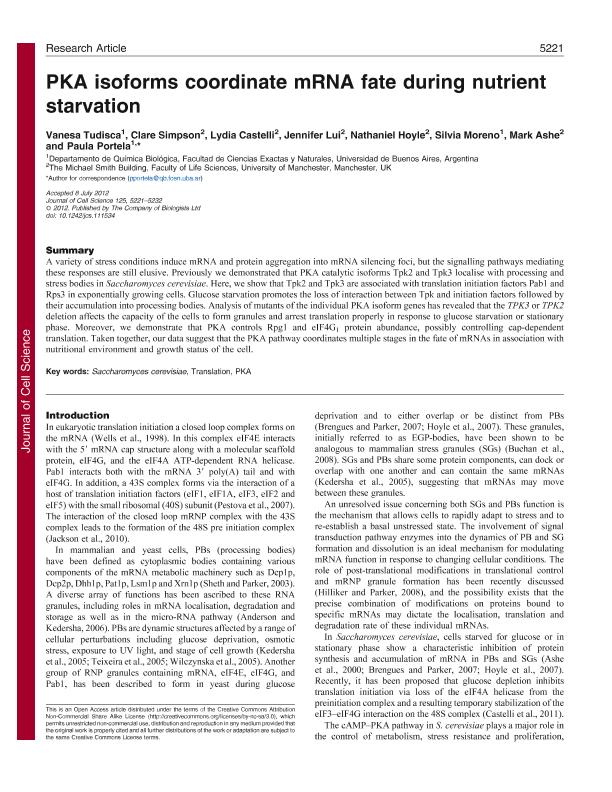Artículo
PKA isoforms coordinate mRNA fate during nutrient starvation
Tudisca, Vanesa Romina ; Simpson, Clare; Castelli, Lydia; Lui, Jennifer; Hoyle, Nathaniel; Moreno, Silvia Margarita
; Simpson, Clare; Castelli, Lydia; Lui, Jennifer; Hoyle, Nathaniel; Moreno, Silvia Margarita ; Ashe, Mark; Portela, Paula
; Ashe, Mark; Portela, Paula
 ; Simpson, Clare; Castelli, Lydia; Lui, Jennifer; Hoyle, Nathaniel; Moreno, Silvia Margarita
; Simpson, Clare; Castelli, Lydia; Lui, Jennifer; Hoyle, Nathaniel; Moreno, Silvia Margarita ; Ashe, Mark; Portela, Paula
; Ashe, Mark; Portela, Paula
Fecha de publicación:
08/2012
Editorial:
Company of Biologists
Revista:
Journal of Cell Science
ISSN:
0021-9533
Idioma:
Inglés
Tipo de recurso:
Artículo publicado
Clasificación temática:
Resumen
A variety of stress conditions induce mRNA and protein aggregation into mRNA silencing foci, but the signalling pathways mediating these responses are still elusive. Previously we demonstrated that PKA catalytic isoforms Tpk2 and Tpk3 localise with processing and stress bodies in Saccharomyces cerevisiae. Here, we show that Tpk2 and Tpk3 are associated with translation initiation factors Pab1 and Rps3 in exponentially growing cells. Glucose starvation promotes the loss of interaction between Tpk and initiation factors followed by their accumulation into processing bodies. Analysis of mutants of the individual PKA isoform genes has revealed that the TPK3 or TPK2 deletion affects the capacity of the cells to form granules and arrest translation properly in response to glucose starvation or stationary phase. Moreover, we demonstrate that PKA controls Rpg1 and eIF4G1 protein abundance, possibly controlling cap-dependent translation. Taken together,our data suggest that the PKA pathway coordinates multiple stages in the fate of mRNAs in association with nutritional environment and growth status of the cell. © 2012.
Palabras clave:
Pka
,
Saccharomyces Cerevisiae
,
Translation
Archivos asociados
Licencia
Identificadores
Colecciones
Articulos(IQUIBICEN)
Articulos de INSTITUTO DE QUIMICA BIOLOGICA DE LA FACULTAD DE CS. EXACTAS Y NATURALES
Articulos de INSTITUTO DE QUIMICA BIOLOGICA DE LA FACULTAD DE CS. EXACTAS Y NATURALES
Citación
Tudisca, Vanesa Romina; Simpson, Clare; Castelli, Lydia; Lui, Jennifer; Hoyle, Nathaniel; et al.; PKA isoforms coordinate mRNA fate during nutrient starvation; Company of Biologists; Journal of Cell Science; 125; 21; 8-2012; 5221-5232
Compartir
Altmétricas



